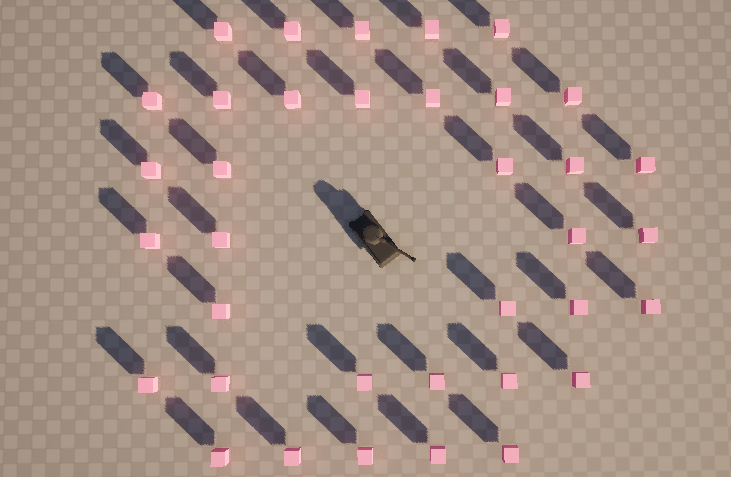
English version below
FR
Pour l’un de mes projets, j’avais besoin d’un système de spawn d’ennemis autour du joueur, avec une part de hasard.
J’aurais pu utiliser des fonctions simples comme Random::UnitSphere, mais cela pouvait générer des positions impossibles à utiliser à cause des collisions ou d’autres obstacles.
Pour résoudre ce problème, j’ai pensé au spatial hashing. Avec ce système, je peux récupérer uniquement les cases valides pour assurer un spawn correct.
EN
For one of my projects, I needed an enemy spawn system around the player, with randomness involved.
I could have simply used functions like Random::UnitSphere, but this could generate invalid positions due to collisions or other obstacles.
To solve this, I implemented spatial hashing. With this system, I can retrieve only valid cells, ensuring enemies always spawn correctly.
Result

Code
struct FSpawnGridHandleBase
{
public:
FVector3d Location;
int32 GridIndex;
FSpawnGridHandleBase(): Location(), GridIndex(0) {}
};
template<class HandleType = FSpawnGridHandleBase>
class SpatialHashingHandler
{
/*
* Give compile error if HandleType do not derive from base handle
* assure that there is at least a location to work with as the TPointHashGrid3d is supposed to work
*/
static_assert(TIsDerivedFrom<HandleType, FSpawnGridHandleBase>::Value, "HandleType must be a type derived from FSpawnGridHandleBase");
/*-------------------------- MEMBERS ----------------------------*/
private:
UE::Geometry::TPointHashGrid3d<int32>* PointHash3;
TArray<HandleType*> AllHandle;
bool bIsClear = true;
/*-------------------------- FUNCTION ----------------------------*/
public:
/**
* Create the hash grid with the given cell size
* @param CellSize The size of each grid cell.
* @param InvalidValue The value to mark as invalid in the grid.
*/
void CreateGrid(int32 CellSize = 100, int32 InvalidValue = -1)
{
PointHash3 = new UE::Geometry::TPointHashGrid3d<int32>(CellSize, InvalidValue);
bIsClear = false;
}
/**
* Reserve memory space for the hash grid to optimize the insertion of a given number of elements.
* @param Num The number of elements to reserve space for.
*/
void Reserve(int32 Num) const
{
PointHash3->Reserve(Num);
}
/**
* Get the pointer to the hash grid.
* @return Pointer to the TPointHashGrid3d<int32> instance.
*/
UE::Geometry::TPointHashGrid3d<int32>* GetGrid() const { return PointHash3;}
/**
* Get a copy of all the handles stored in the Spatial Hashing Handler.
* @return An array of pointers to the HandleType instances.
*/
TArray<HandleType*> GetHandlesCopy() const { return AllHandle;}
/**
* Get a const reference to the array of pointers to stored HandleType instances.
* @return Const reference to the array of pointers to HandleType instances.
*/
const TArray<HandleType*>& GetHandlesRef() const { return AllHandle;}
/**
* Delete the hash grid and mark as clear if conditions are met.
* Deletes the TPointHashGrid3d instance if it exists and clears the state if all handles are empty.
*/
void DeleteGrid()
{
if(PointHash3 != nullptr)
{
delete PointHash3;
}
if(AllHandle.IsEmpty())
{
bIsClear = true;
}
}
/**
* Reset the handles in the grid and set the clear state if the hash grid is not initialized.
*/
void ClearGrid()
{
AllHandle.Reset();
if(PointHash3 == nullptr)
{
bIsClear = true;
}
}
/**
* Add a handle to the Spatial Hashing Handler.
* @param Handle Pointer to the HandleType instance to be added.
* Updates the GridIndex of the handle by adding it to the list of handles and inserts its location into the point hash grid if the handle is not null.
*/
void AddHandle(HandleType* Handle)
{
if(Handle)
{
Handle->GridIndex = AllHandle.Add(Handle);
PointHash3->InsertPoint(Handle->GridIndex, Handle->Location);
}
}
/**
* Flushes the grid data by clearing all handles and deleting the grid.
* Clears all handles in the grid, deletes the grid instance, and sets the clear state to true.
*/
void FlushGrid()
{
ClearGrid();
DeleteGrid();
bIsClear = true;
}
SpatialHashingHandler(): PointHash3(nullptr) {}
~SpatialHashingHandler()
{
ensureMsgf(bIsClear, TEXT("You should call 'FlushGrid' before deleting SpatialHashingHandler"));
}
void UTSSpawnManagerComponent::SpawnTest(float MinDist, float MaxDist, UClass* SpawnClass) const
{
if(UTSSpawnSubsystem* lSSub = GetWorld()->GetSubsystem<UTSSpawnSubsystem>())
{
APawn* lPlayerPawn = UGameplayStatics::GetPlayerController(GetWorld(),0)->GetPawn();
check(lPlayerPawn);
TArray<ATSSpawnLocationActor*> OutSpawns;
lSSub->GetSpawnLocationForDistance(lPlayerPawn->GetActorLocation(), MinDist, MaxDist,OutSpawns);
//TODO Check player movement forward/backward camera view
ATSSpawnLocationActor* OutSpawn = nullptr;
int32 OutIndex = -1;
TankySurvivorUtils::TSArray_Random(OutSpawns, OutSpawn,OutIndex);
if(ensure(OutSpawn))
{
FTransform lTransform{OutSpawn->GetTransform()};
FActorSpawnParameters lParams;
lParams.ObjectFlags = RF_Transient;
lParams.Owner = GetOwner();
GetWorld()->SpawnActor<AActor>(SpawnClass,lTransform,lParams);
}
}
}
void UTSSpawnManagerComponent::InitializeComponent()
{
Super::InitializeComponent();
UTSSpawnSettings* lSetting = GetMutableDefault<UTSSpawnSettings>();
check(lSetting);
UAssetManager& AssetManager = UAssetManager::Get();
FSoftObjectPath AssetPath = AssetManager.GetPrimaryAssetPath(lSetting->GetSpawnDefinition());
TSubclassOf<UTSSpawnDefinition> AssetClass = Cast<UClass>(AssetPath.TryLoad());
check(AssetClass);
SpawnDefinition = const_cast<UTSSpawnDefinition*>(GetDefault<UTSSpawnDefinition>(AssetClass));
}
void UTSSpawnManagerComponent::BeginPlay()
{
Super::BeginPlay();
check(SpawnDefinition);
FTimerDelegate TimerDel;
FTimerHandle TimerHandle;
TimerDel.BindUFunction(this, FName("SpawnTest"), SpawnDefinition->GetMinDistance(), SpawnDefinition->GetMaxDistance(), SpawnDefinition->GetSpawnable());
GetWorld()->GetTimerManager().SetTimer(TimerHandle, TimerDel, SpawnDefinition->GetSpawnRate(), true);
}